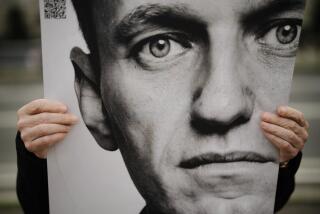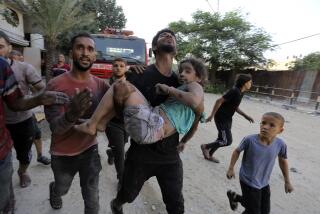Russian School Takeover Stirs Self-Criticism Among Arabs
CAIRO — Expressions of shame and self-reproach swept the Arab world Saturday as Muslims mourned the deaths of Russian schoolchildren -- and voiced unusually critical condemnations of the social ills widely blamed here for breeding terrorism.
The Arab world has watched with mounting disgust in recent weeks as a wave of civilian hostages -- some of them Arabs and Muslims -- were slaughtered by masked insurgents in Iraq. Last week, newspapers and satellite channels were dominated by pictures of bloodied, naked children in southern Russia fleeing armed guerrillas suspected to be Islamic rebels. Many Arabs found themselves in an ever-more-common dilemma: struggling to reconcile their sympathy for a political cause with growing revulsion at the wrath leveled by self-described “holy warriors” against the innocent.
“What is the guilt of those children? Why should they be responsible for your conflict with the government?” Grand Sheik Mohammed Sayed Tantawi, Egypt’s highest-ranking cleric, railed during Friday prayers in the Egyptian town of Benha. “You are taking Islam as a cover and it is a deceptive cover; those who carry out the kidnappings are criminals, not Muslims.”
Tantawi’s refrain was a familiar one among Muslims who have felt unfairly tarred by the swell of high-profile bloodbaths carried out by fellow believers: This wasn’t Islam.
But on Saturday, some prominent Arabs came forward with a more sobering interpretation: Corrupt, repressed Arab and Islamic societies have become breeding grounds for terrorism. It’s a judgment often heard among Western critics but rarely voiced in heavily censored Arab rhetoric.
“Most perpetrators of suicide operations in buses, schools and residential buildings around the world for the past 10 years have been Muslims,” wrote Abdul Rahman Rashed, general manager of the popular Al Arabiya television channel. In a blunt column in the pan-Arab newspaper Asharq al Awsat, Rashed listed attacks carried out by Muslims in Iraq, Russia, Sudan, Saudi Arabia and Yemen.
“Our terrorist sons are an end product of our corrupted culture,” he wrote. “The picture is humiliating, painful and harsh for all of us.”
The guerrillas who seized the school in the town of Beslan on Wednesday and held more than 1,000 captives were believed to have been linked to Islamic separatists in the Russian republic of Chechnya.
In the aftermath of Friday’s shootout between troops and the hostage-takers, which left more than 300 people dead, Russian officials told reporters that 10 of the more than two dozen fighters were Arabs, though the statement could not be immediately verified.
Chechnya has long figured prominently among the battles listed by radical Islamists as jihads, or holy struggles. Like Palestinians, Iraqis and Kashmiris, the predominantly Muslim Chechens are generally viewed sympathetically by the Arab world, and their plight is often pointed to as proof that Islam has come under fire around the world.
Iran and virtually all Arab governments put aside any Chechen sympathies and condemned the hostage-taking and ensuing carnage in Beslan. Such broad outrage has been rare after assaults in Iraq or Saudi Arabia and all but unthinkable after attacks on Israeli civilians.
King Abdullah II of Jordan, who was visiting Putin in Russia last week, called the school takeover “criminal and cowardly.”
The Saudi daily Arab News blasted Putin as “a servant of state dictatorship and control,” a man who could not afford to lose his “tough-man image.” But the editorial saved its harshest condemnation for the guerrillas, “who had put themselves in a position where no one would shed tears when the punishment came. They reached a new low when they chose toddlers as bargaining chips.”
“The world sympathized with them. But no one believed that those deaths [of Chechens] in a war situation gave them the right to do what they did in Beslan,” the editorial said. “If the Chechens had set out deliberately to shame and defeat a noble cause -- and there is no cause nobler than that of freedom -- they could not have done any better.”
An editorial in Lebanon’s Daily Star called for “better governance systems and socioeconomic opportunities in those countries and regions, including our Middle East, that seem to generate so many terrorists.”
“Terror emanates largely from despair, hopelessness and humiliation,” the editorial said. “And these are sentiments whose causes can be identified, tracked, grasped and addressed.”
More to Read
Sign up for Essential California
The most important California stories and recommendations in your inbox every morning.
You may occasionally receive promotional content from the Los Angeles Times.









